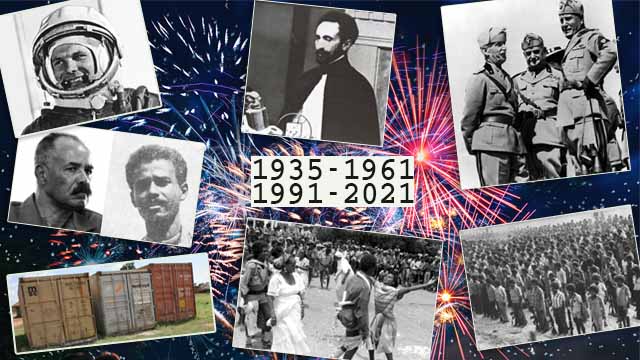Eritrea’s Bittersweet Memory of A 30-Year Struggle

Eritrea has bittersweet memory of a 30-year struggle that was eked out by the botched 30-years of Governance.
In 1935, little did Italy know that its decision to invade Ethiopia would lead to a World War II. Little did Italy know, too, that the Eritrean Askaris it hired to do the invasion of Ethiopia would also abandon it at the first opportune moment. In fact, that’s exactly what the Askaris did when Great Britain and its allies dropped leaflets informing them that King Haile Selassie was back in power and the Askaris should switch their allegiance. Not only the WWII started in 1935, but also 5 years later, the defeat of Italy by the British, Free French, and Belgian Forces heralded the winning and reversing the turn of events in favor of the Allies resulting in the liberation of Eritrea and Ethiopia from the yoke and arrow of fascism.
King Haile Selassie of Ethiopia missed a huge opportunity to correct the trajectory of Ethiopia’s historical path by becoming a leader who had the power to introduce rudimentary democratic projects. What he did instead was annex Eritrea by the classic methods of divide and conquer. Alas, the Ethiopian army that deposed the King, too, missed its opportunity by choosing violent confrontation on the question of Eritrea instead of reconciliation. After all, Eritrean Fronts, and Tigray Fronts, and the Ethiopian Derg under Mengistu Hailemariam were all in the same political and ideological alleyway. The latter may have left Asmara University open, but it was emptying Eritrea of its youth who were supposed to attend it.
The aftermath of WWII brought forth clear winners: the USA and its Western allies, save the Nazi Germany as the leader of the power axis, on whose side were Japan and Italy. The USA and its allies were becoming confident of their political and military supremacy to a point that the surrendering countries like Germany and Japan became beneficiaries of such confidence. The Marshall Plan would bring back these two defeated countries from the ashes of the war to become two exemplary countries who would put their economic house in order. Meanwhile, the Cold War was afoot in which The Soviet Union and the USA became ideological rivals to a point of wanting to dominate the world to their sphere of influence. Out of this intense competition came technological advancement.
In 1961, The Soviet Union became the first country to send a man – Yuri Gagarin – to space orbiting the earth. Thus, the race to space had begun in earnest between the Soviet Union and the United States. In the immediate aftermath of WWII, the influence of the U.S. and its allies in the world had firm grounding, whatever the U.S. says goes and so it went. Thus, Eritrea, it was determined, couldn’t be granted its independence as a former colony of the then firmly defeated Fascist Italy. For some indecipherable political reasoning, the two former Italian colonies, Libya and Somalia, were granted their independence but not Eritrea. Thus, in 1961, in defiance to such a determination, in the corridors of the Red Sea, Eritreans started a revolutionary war of independence that took thirty long years to accomplish. However, another thirty years has passed since Eritrea’s independence, and the country continues to be in one war footing after another to this day. This enigmatic Red Sea nation has a very complex history, history that requires a great deal of historical and contextual synthesis to comprehend it thoroughly.
Therefore, instead of a lament, how about resorting to the world of optics; carefully selecting two video clips that can help in the much-needed understanding of the how and why The Horn of Africa continues to dive into an endless turmoil after turmoil? Granted, before the bittersweet memory of the thirty years could be savored, the memory of the botched subsequent thirty years of poor governance is replacing it. Fighting against such fresh memory is a challenge that continues to eke out the worse in Eritreans. A little highlight about the clips.
The first: A French politician, a minister, a traveler, a writer, and a member of the French academy, Jean Francois Deniau (JFD) lends a much-needed foreign voice to Eritrea’s cause for independence. This rigorously researched documentary deals with an expansive history and politics of the region and the role Europeans played in the process of problematizing it to suit their post-colonial ambitions. More importantly though, the documentary contains rare footage and historical images; interviews of revolutionary combatants of all generations including that of the pioneers of the struggle; civilians who enlisted to become part of Italy’s colonial ambitions when it invaded Ethiopia. They give firsthand account interviews; many had already reached the octogenarian phase by the time of the interviewing. In this documentary the viewer will hear the rare voice of civilian Eritrean mothers and fathers whose sons and daughters went on to fight for independence. Some voices of dignitaries are also included in this documentary. It’s a massively important historical and political voice that gives an expansively complex picture of Eritrea and The Horn of Africa.
The second: This comprises a two-part interview, a direct account of the then young combatant (Lingo) who joined the protracted struggle by putting his life and his youth on the line to the wheel of the revolution at a very critical junction in the journey toward independence of Eritrea. He becomes the voice, the narrator of Eritrea’s struggle, a bridge between the people of Eritrea in Diaspora and those who are fighting in the fields of Eritrea to bring independence. His eloquence captivates Eritreans in a rapturous fixation in Bologna, in the United States, in the world. So, get a tea in a kettle, coffee, or whatever drink you fancy, sit back, and plan to spend three hours of your time to watch these video clips, your assumptions will be challenged, any assumptions you may have had before about Eritrea, the region, and the Superpowers. You won’t be disappointed.
Links:
1-The Documentary
2-The Interviews–PART 1 and PART 2




Awate Forum